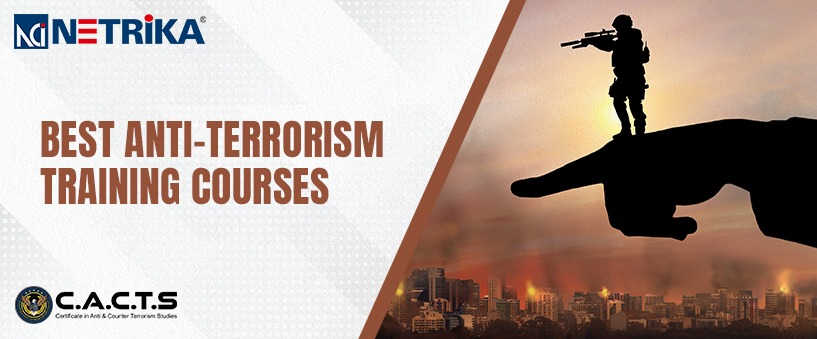
Best Anti-Terrorism Training Courses
The anti-terrorism and counter-terrorism certificate course is meant to prepare students for the anti-terrorism certificate curriculum. The course discusses the objective and function of the intelligence community, as well as the fundamental principles of intelligence analytic tactics. It mixes critical topics with an examination of contemporary international terrorism and counter-terrorism strategies.
The anti-terrorism certificate also covers the nature, roots, evolution, objectives, techniques, and organisation of terrorism and terrorist groups, as well as the distinctions between terrorism and other forms of political violence. It explains why people turn to terrorism, how terrorism plays a role in larger international conflicts, and how terrorism has emerged in various places of the world.
Unclassified anti-terrorism training in India
Recognising the importance of the rule of law and fundamental human rights in counterterrorism operations, the anti-terrorism certificate course aims to provide a useful and relevant resource. The course aims to improve candidates’ understanding of terrorism, its consequences, and related issues by giving a thorough understanding of important international, regional, and national tools and approaches. The online anti-terrorism training courses are designed to improve candidate performance by integrating theory to practise, fostering critical thinking, and utilising cutting-edge interactive teaching techniques such as experiential learning, case studies, and group projects.
The anti-terrorism certificate course teaches professionals how to spot terrorist techniques and counter their plans and acts. A trained counterterrorism expert is educated to recognise and assess the following terrorist acts:
- Drug and ammunition trafficking, money laundering, and the illegal movement of chemical, radioactive, or biological materials or weapons are all examples of transnational organised crime.
- Extortion, murder, assault, robbery, or hostage-taking are all serious offences that jeopardise a territory’s integrity.
- They focus on behaviours that endanger friendly relationships or result in significant international crimes.
A certified anti-terrorism specialist contributes to national security by using their sufficient experience to prevent terrorist activities through protective-hardening measures and recognising and controlling the hazards. To mitigate the impact of the act, they use their theoretical and technical knowledge to policy formation by assessing the strength and susceptibility of the target of an explosive device.
Counter terrorism qualifications
The educational requirements for anti-terrorism training in India differ by organisation. For a competent anti-terrorism specialist working for intelligence services, for example, a bachelor’s or master’s degree in international affairs, national security studies, or an analogous area is almost always required. Other roles may necessitate a bachelor’s or master’s degree in criminal justice or analytics.
Certified anti-terrorism specialists must have strong critical thinking skills, excellent interpersonal skills, the capacity to think creatively, and data analytics, data visualisation, and communication talents.
Netrika offers an anti-terrorism certificate course
CACTS and Netrika partnered to create the trained Anti-Terrorism Training Course (CACTS) in order to generate a fleet of more vigilant and prepared anti-terrorism specialists. The comprehensive curriculum of the anti-terrorism certification in India familiarises students with the risks and difficulties confronting international security, with real-world case studies and counterforces. Netrika’s comprehensive and value-added CACTS training improves comprehension of terrorist threat identification and pattern trends.

